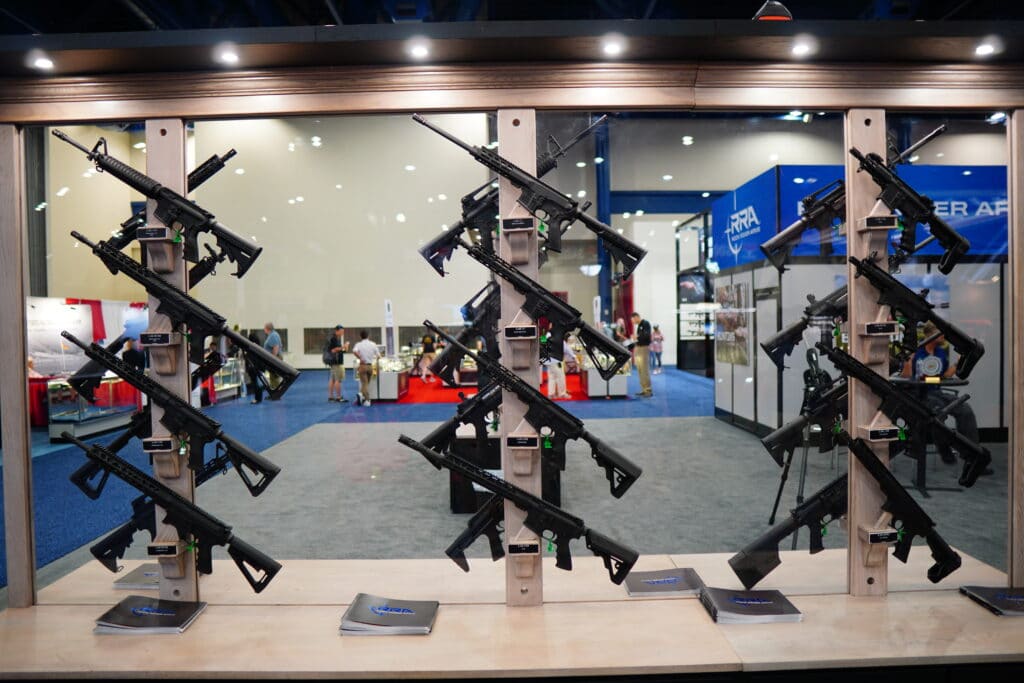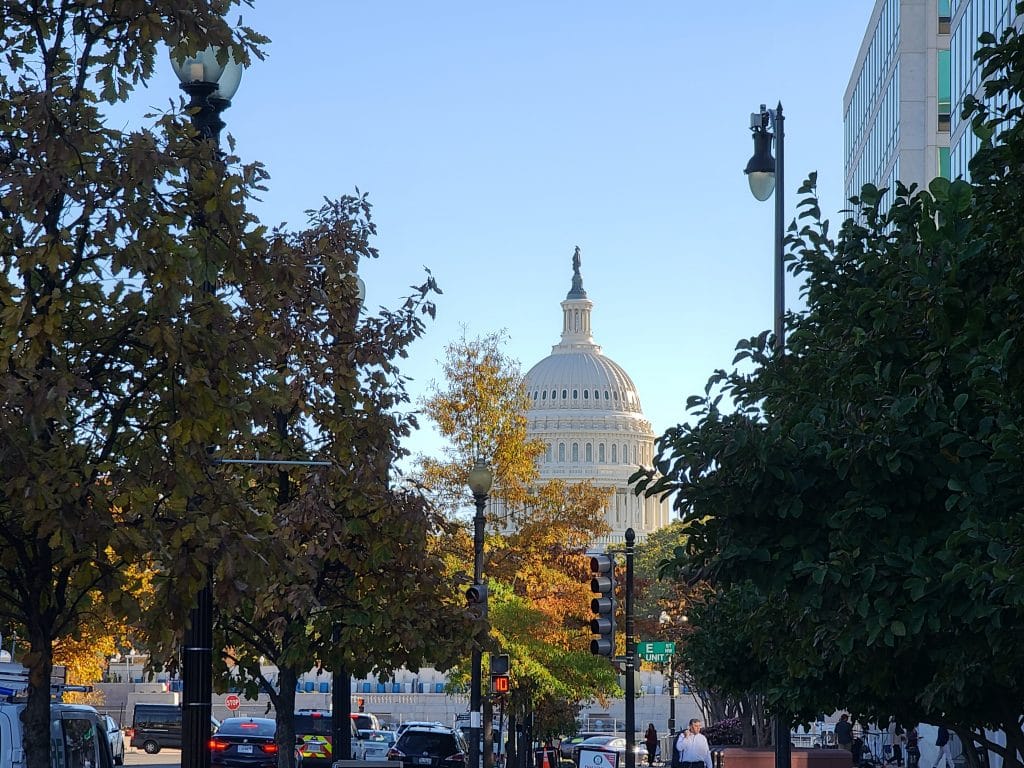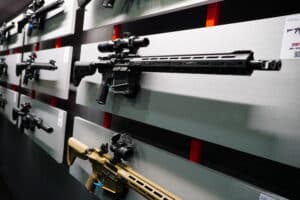We’re starting to see some pushback against the Senate gun deal.
Senator John Cornyn (R., Texas) was booed during his speech to his party’s convention. The disapproval was over his involvement in the framework. And it was worse in person than comes across on video, according to one report.
That’s significant since Cornyn is probably the most important member of the 20 senator coalition behind the deal. If he is forced to back off due to backlash, it will likely upend the whole attempt. But, while Cornyn has IDed several sticking points to the final deal, he has remained steadfast in his support for it and prediction that it could be voted on as soon as next week.
Contributing Writer Jake Fogleman zooms out to predict when and where we’ll get a more definitive look at how this all plays out politically. And I give a detailed breakdown of the sticking points inside the deal.
Plus, Politico’s Burgess Everett joins the podcast to explain the gun talk holdups and where this is all headed.

Analysis: When Will We See How the Politics on New Gun Restrictions Play Out? [Member Exclusive]
By Jake Fogleman
How will the decision to support new gun restrictions, or the refusal to do so, in the wake of the Uvalde shooting impact the political future of Republicans?
It’s difficult to say for sure. Some have taken steps to hedge against political backlash as they consider action on gun policy. Of the ten Republican Senators that worked to forge a deal on a federal gun package, for instance, four are set to retire at the end of their terms while the other six are not up for re-election this cycle. None of them will have to face voters any time soon.
Republicans that will soon face voters have been noticeably tight-lipped about their position on the package.
The state level may offer a more immediate test for how voters might reward or punish a politician based on gun policy. And nowhere is that dynamic starker than in the Lone Star State itself.
Being the state where the horrific attack at Robb Elementary School took place, many eyes have been on Texas and its incumbent Governor Greg Abbott (R.). Since the attack, Abbott has chosen to eschew calls for new gun control and has instead encouraged more robust enforcement of current gun laws in addition to new school safety protocols.
That puts him in stark contrast with the man who hopes to unseat him this November, perennial candidate Beto O’Rourke. The democrat made a name for himself during the 2020 Democratic Presidential primaries as a strident gun control supporter. His public call for the confiscation of AR-15s was among the most aggressive gun-control stances taken by a national political candidate in at least a generation. It also contributed to the demise of his candidacy.
It comes as no surprise then that in the wake of the Uvalde shooting O’Rourke has seized the moment to reestablish his gun control bona fides and differentiate himself from his opponent.
O’Rourke crashed a press conference with Abbott in the immediate aftermath of the shooting and accused him of being culpable in the attack. He has since reiterated his position on confiscating AR-15s as his preferred response to mass shootings.
In a longtime red state known for valuing gun rights, but one that’s been trending blue to an extent over the last decade, it’s difficult to say how those divergent approaches will play with Texas voters come November. Complicating matters, as with their approach to gun policy, two of the most recent polls on the race offer divergent indicators of how voters are feeling.
A new poll released Monday from BluePrint Polling found Abbott’s lead over O’Rourke has grown to a 19-point advantage among Texas voters. That’s despite the poll being conducted by a Democratic pollster in the weeks immediately following the Uvalde massacre.
However, a new Quinnipiac poll released Wednesday tells a different story. That poll finds that the race has actually tightened between the two candidates, with Abbott now only enjoying a 5-point lead over his Democratic challenger, down from 15 points in another Quinnipiac poll conducted last December.
Adding to the complication, the Quinnipiac poll finds that Texas voters now support stricter gun laws 58 to 38 percent, and 51 percent of voters think stricter gun laws would help decrease the number of mass shootings, up from just 42 percent last June.
This would seem to indicate a burgeoning backlash against Abbott and his approach to gun policy as it pertains to mass shootings, one that could advantage O’Rourke this November. But even that much is not so clear.
The same Quinnipiac poll also shows a plurality think Abbott will do a better job handling gun policy, 47 to 43 percent. It also shows a plurality oppose an assault weapons ban, which certainly calls into question O’Rourke’s strategy of running on not only a ban on AR-15s but their confiscation too.
The dynamics may be a bit murky in terms of which candidate enjoys an advantage among voters, but what’s clear is the issue has the potential to make a real difference. Gun policy was found to be the third-most urgent issue facing Texas voters overall in the Quinnipiac poll, and it was similarly situated among Independent’s most urgent issues.
So, when it comes to the potential for gun policy to affect electoral politics, the action taken at the federal level and its fallout might be hard to discern for a while. Instead, look to Texas this November for the clearest possible test case.
Podcast: Politico’s Burgess Everett Gives Insight into How Senate Gun Talks are Unfolding [Member Early Access]
By Stephen Gutowski
Senate gun negotiations carried on this week after encountering a few speed bumps.
That’s why I had another top Capitol Hill reporter on the show. This week, I’m joined by Burgess Everett of Politico. He has spent decades reporting on and talking to the key senators at the center of the gun deal.
Everett said that while the deal has a lot of momentum, he’s seen many so-called must-pass bills fail. He said that red flag grants being expanded to non-red-flag laws and how gun prohibitions should be extended to those that commit violence against their girlfriends are creating the most consternation. How those details get ironed out could determine whether a deal gets through at all.
But Everett said the way senators are planning to change the background check system to get at juvenile criminal records is likely to be much more consequential than those two provisions. It appears the plan is to create a special new process for those 18 to 20 years old, one that includes a pseudo waiting period to ensure the FBI can access the often-sealed records.
Despite the complexity and impact of the background check change, Everett said it has yet to generate any noticeable controversy among the senators.
Mary Katharine Ham joins the show for a members’ segment too. She explains her background with guns and what it’s like to do shows on CNN or ABC while being a pro-gun commentator.
Plus, Contributing Writer Jake Fogleman and I discuss Texas Governor Gregg Abbott’s (R.) policy response to the Uvalde shooting.
You can listen to the show on your favorite podcasting app or by clicking here.
The full show is also available on our YouTube channel.

Analysis: Potential Sticking Points in the Senate Gun Deal Framework [Member Exclusive]
By Stephen Gutowski
Senate gun negotiations have reached a critical stage, and hiccups are starting to show.
Senator John Cornyn (R., Texas) is one of the most important signatories to the framework. He has long been the GOP’s go-to man on gun policy. He was key to getting the framework together. He’s also now the most publicly pessimistic about the deal making it across the finish line.
Cornyn had initially said he hoped to get the text of the bill done by the end of this week, which could still happen, but he’s become more pessimistic as the week has gone along.
“I’m frustrated,” Cornyn told CBS News reporter Alan He on Thursday. “I’m not as optimistic right now. But we’re continuing to work.”
So, what are the potential sticking points, and why are they so hard to work out? We only have the barebones framework, comments from Senators, and reporting about the negotiations to go off of right now since the bill’s text isn’t out yet. But what we have gives us some insight into the issues at play.
Red Flag Grant Program
While the Senate framework proposal appears to try and avoid direct controversy over the temporary gun confiscation orders by making its proposal a grant program rather than a national red flag law, a sticking point remains. Republicans want to expand this provision to fund more than just red flag laws. Cornyn said states that don’t pass red flag laws should have access to the same funding for other programs aimed at preventing mass shootings.
“One of the issues has to do is whether the funds that we will vote for will be available to states that don’t have red flag laws, but do have crisis intervention programs and things like mental health courts, veterans courts, assisted outpatient treatment programs,” he told CNN’s Manu Raju on Wednesday. “I just don’t think anything that funds 19 states for their programs but ignores other states that have chosen not to have a red flag law but rather have other ways to address the same problem is going to fly.”
This could create an impasse for a couple of reasons. First, the framework already includes a provision to expand a mental health crisis response program to all 50 states. Second, it further diminishes the potential incentive for states to pass red flag laws. According to Cornyn, everyone is on the same page about those things.
“We’re not incentivizing states that don’t have red flag laws to pass them,” Cornyn told Dana Loesch on Wednesday. “That would be inappropriate.”
But it’s an open question if the program doesn’t do much to increase the adoption of red flag laws among the 31 states who don’t already have one, will Democrats view it as consequential enough to go along with the changes?
Expanding Definition of Domestic Violence
The other major provision Cornyn identified as holding up the deal is how to define what a “boyfriend” is for the purpose of domestic violence. Currently, federal law bars anyone convicted of a domestic violence misdemeanor from owning or possessing firearms. However, the prohibition only extends to somebody who commits violence against someone they are married to, have a child with, live with, or are related to.
“The other issue has to do with the way that nontraditional relationships are handled in terms of domestic violence and misdemeanors,” Cornyn told Raju. “We’ve got to come up with a good definition of what that actually means.”
There is some difficulty in defining a romantic partner in federal law. Some Democrats apparently want to extend this to situations where people who dated at one point and then got into an altercation years after that point. Republicans are uncomfortable with that.
New Background Check Process for 18-20-Year-Olds With Juvenile Records and a De Facto Waiting Period
Surprisingly, Cornyn didn’t identify the details of checking juvenile records as one of the significant sticking points. That’s interesting since it is likely the most consequential change to federal gun laws in the entire package.
If the text of the provision matches a recent report in The Trace, the Senators are going to create an entirely new background check process for 18-to-20-year-olds that includes a de facto waiting period. That would represent a remarkable departure from how the National Instant Criminal Background Check System (NICS) has been designed to work since its inception back in 1993. Namely, that it would no longer be designed with instant checks in mind.
As the name implies, a NICS check is usually instantaneous. It does already have a process by which a check can be delayed for up to three days for the FBI to conduct a more thorough examination of a buyer’s criminal or mental health records. However, that only happens in the rare number of cases where the FBI identifies a potential disqualifying record, such as pending charges, but isn’t able to immediately obtain details on that record.
In contrast, the Senate deal seems to apply this delayed status to all buyers under the age of 21 in order to provide time for the FBI to locate potential juvenile criminal or mental health records.
That could prove controversial for a number of reasons. First and foremost, creating what is effectively a federal waiting period is likely to garner heated opposition from gun-rights groups, even if it is limited to younger adults. Many will see it as a slippery slope.
Then there’s the question of what juvenile records should be included as disqualifying and how those records can even be checked by the FBI. Lawmakers across the aisle have already started raising those concerns.
“The access to juvenile records will be a difficult piece of work because states have different laws with regards to that eliminating juvenile records,” Senator Mitt Romney (R., Utah), who has signed on to the framework, told NBC News on Monday. “And so how to deal with those differences will be a draft person’s nemesis.”
Prominent House Democrat Alexandria Ocasio-Cortez said she is particularly concerned about “the juvenile criminalization, the expansion of background checks into juvenile records.”
“I want to explore the implications of that and how specifically it’s designed and tailored,” she told The Independent’s Eric Michael Garcia on Monday. “After Columbine, we hired thousands of police officers into schools, and while it didn’t prevent many of the mass shootings that we’ve seen now, it has increased the criminalization of teens in communities like mine.”
Then there’s the issue that the new background check procedure appears to end once a buyer turns 21. Perhaps the text will provide further clarity, but it’s unclear why this new background check procedure is needed, and selected juvenile criminal records can’t simply be added to the current NICS process.
Deal Remains Likely
While all of these hangups could derail the deal, none of them are guaranteed to do so. The fact a deal had ten Republican votes right out of the gate gives it a lot of potential. That Minority Leader Mitch McConnell (R., Ky.) has expressed support for the deal, and Majority Leader Chuck Schumer (D., N.Y.) has committed to a vote as soon as possible, adds to the possibility. And Cornyn’s public doubt casting may simply be a negotiating tactic.
Shortly after Cornyn told CBS that he felt frustrated by talks on Thursday, Senator Kyrsten Sinema (D., Ariz.) interjected to say, “we’re optimistic!”
“Senator Sinema says I’m optimistic,” Cornyn replied.
That’s it for now.
I’ll talk to you all again soon.
Thanks,
Stephen Gutowski
Founder
The Reload








Only Members can view comments. Become a member today to join the conversation.